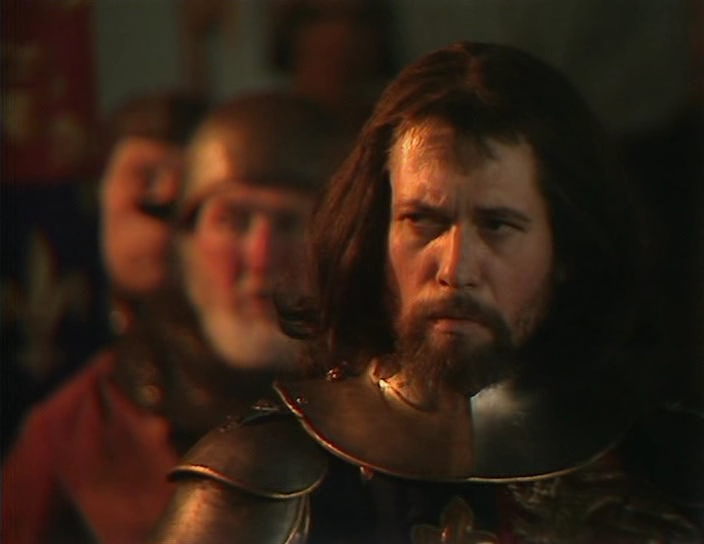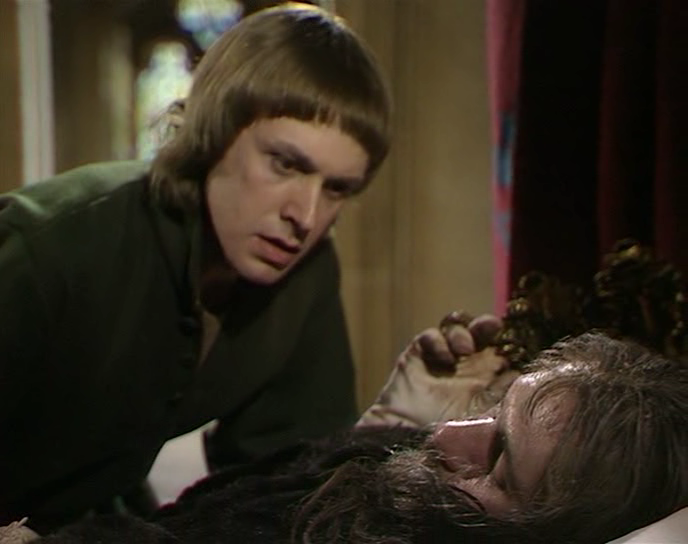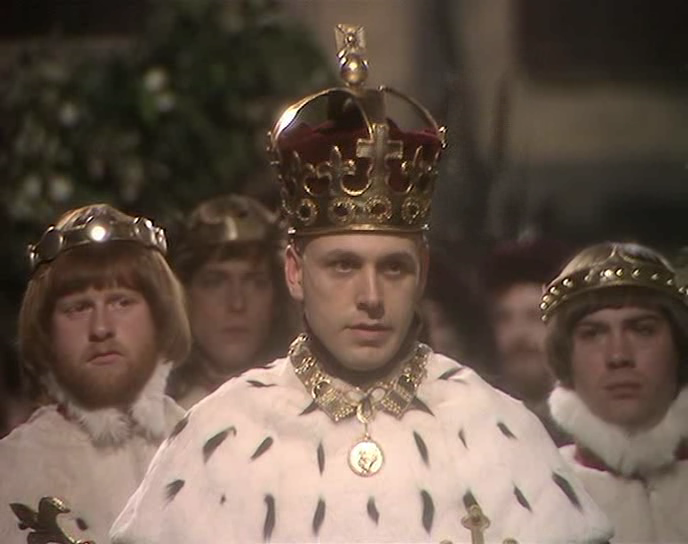

Making its debut with Romeo and Juliet on 3 December 1978, and concluding nearly seven years later with Titus Andronicus on 27 April 1985, the BBC Television Shakespeare project was the single most ambitious attempt at bringing the Bard of Avon to the small screen, both at the time and to date.
Producer Cedric Messina was already an experienced producer of one-off television Shakespeare presentations, and was thus ideally qualified to present the BBC with a daunting but nonetheless enticingly simple proposition: a series of adaptations, staged specifically for television, of all 36 First Folio plays, plus Pericles (The Two Noble Kinsmen was considered primarily John Fletcher's work, and the legitimacy of Edward III was still being debated).
The scale of Messina's proposal, far greater than that of previous multi-part Shakespeare series such as An Age of Kings (BBC, 1960) and Spread of the Eagle (BBC, 1963), required an American partner in order to guarantee access to the US market, deemed essential for the series to recoup its costs. Time-Life Television agreed to participate, but under certain controversial conditions - that the productions be traditional interpretations of the plays in appropriately Shakespearean period costumes and sets, designed to fit a two-and-a-half-hour time slot.
The running-time requirement was swiftly jettisoned when it became clear that the major tragedies in particular would have suffered severely, but other artistic restrictions remained largely in place throughout. Although later productions under Messina's successors Jonathan Miller and Shaun Sutton would be more experimental, Miller was unable to persuade first-choice directors such as Peter Brook and Ingmar Bergman to take part, and Michael Bogdanov resigned from Timon of Athens (eventually tx, 4/16/1981, with Miller himself directing) after his modern-dress interpretation was considered too radical a departure.
This gave the BBC Television Shakespeare cycle the reputation of being overly staid and conventional, which was not always deserved. Though Messina's own productions (1978-80) were largely conservative, Jonathan Miller (1980-82) revamped things both visually (thanks to a design policy of sourcing sets and costumes from great paintings of the era in which the play was set) and in terms of direction and casting, in some cases using popular actors with little or no Shakespeare experience (John Cleese as Petruchio, Bob Hoskins as Iago) to attract new and younger audiences.
Under Miller, directors such as Jack Gold, Jane Howell and Elijah Moshinsky were encouraged to be more adventurous, with Howell in particular adopting such a stylised approach for The Winter's Tale (tx. 8/2/1981) and the Henry VI/Richard III cycle (tx. 2-23/1/1983) that they pushed the definition of "traditional" to the limit, but also garnered the series some of its best reviews. Miller's aesthetic policies continued under Shaun Sutton (1982-85), who brought the project to a belated close.
Whatever its artistic reputation, there was no doubt that the BBC Television Shakespeare was a commercial triumph, breaking even financially by 1982 (ahead of expectations) and fully justifying Messina's gamble. Its success was helped by the rapid growth of video recorders in schools, creating a secondary market that was much bigger than initially predicted - though the initial decision to sell the plays only as a complete set provoked complaints from people who baulked at paying the substantial asking price because they were after a smaller selection or individual titles. The BBC eventually released some of the more popular titles separately, but it was not until late in 2005 that the entire series was available individually on DVD at a competitive price.
Although the BBC Television Shakespeare project as a whole met with a mixed reception, it had several positive virtues. Chief among them was the fact that its completist remit meant that several of the more obscure plays received their first television adaptation, and in most cases the BBC version remains the only one. Happily, such productions as Henry VIII (tx. 25/2/1979), Cymbeline (tx. 10/7/1983), Pericles (tx. 11/6/1984) and Titus Andronicus were considered amongst the cycle's most impressive achievements, with Henry VIII subsequently voted the best production of all by the Shakespeare Association of America.
A complete list of BBC Television Shakespeare productions is as follows:
Series One (producer: Cedric Messina): Romeo and Juliet (tx. 3/12/1978), Richard II (tx. 10/12/1978), As You Like It (tx. 17/12/1978), Julius Caesar (tx. 11/2/1979), Measure For Measure (tx. 18/2/1979), Henry VIII (tx. 25/2/1979)
Series Two (p. Cedric Messina): Henry IV Part One (tx. 9/12/1979), Henry IV Part Two (tx. 16/12/1979), Henry V (tx.23/12/1979), Twelfth Night (tx. 6/1/1980), The Tempest (tx. 27/2/1980), Hamlet (tx. 25/5/1980).
Series Three (p. Jonathan Miller): The Taming of the Shrew (tx. 23/10/1980), The Merchant of Venice (tx. 17/12/1980), All's Well That Ends Well (tx. 4/1/1981), The Winter's Tale (tx. 8/2/1981), Timon of Athens (tx. 16/4/1981), Antony and Cleopatra (tx. 8/5/1981)
Series Four (p. Jonathan Miller): Othello (tx. 4/10/1981), Troilus and Cressida (tx. 7/10/1981), A Midsummer Night's Dream (tx. 13/12/1981)
Series Five (p. Jonathan Miller, Shaun Sutton): King Lear (tx. 19/9/1982), The Merry Wives of Windsor (tx. 28/12/1982), Henry VI Part One (tx. 2/1/1983), Henry VI Part Two (tx. 9/1/1983), Henry VI Part Three (tx. 16/1/1983), Richard III (tx. 23/1/1983), Cymbeline (tx. 10/7/1983)
Series Six (p. Shaun Sutton): Macbeth (tx. 17/10/1983), The Comedy of Errors (tx. 24/12/1983), The Two Gentlemen of Verona (tx. 27/12/1983), Coriolanus (tx. 21/4/1984), Pericles (tx. 11/6/1984)
Series Seven (p. Shaun Sutton): King John (tx. 24/11/1984), Much Ado About Nothing (tx. 30/11/1984), Love's Labour's Lost (tx. 5/1/1985), Titus Andronicus (tx. 27/4/1985)
The BBC also produced Shakespeare in Perspective, an accompanying series of 25-minute personal introductions to individual plays by an eclectic range of presenters from the literary (Anthony Burgess, Dennis Potter, Jilly Cooper) to the scholarly (Germaine Greer, Frank Kermode, Michael Wood) to the celebrity (Roy Hudd, George Melly, Barry Took). These usually took the form of straight-to-camera addresses from assorted locations with some connection to the play, which were intercut with extracts from the accompanying BBC Shakespeare production, usually screened later that evening.
Michael Brooke
For the BBC Television Shakespeare, tx. 9/12/1979, colour, 147 mins
Director David Giles
Production Companies BBC Television, Time-Life Television
Producer Cedric Messina
Script Editor Alan Shallcross
Designer Don Homfray
Music Adviser David Lloyd-Jones
Cast: Jon Finch (King Henry IV), David Gwillim (Prince Hal), Tim Piggot-Smith (Hotspur), Anthony Quayle (Sir John Falstaff), Brenda Bruce (Mistress Quickly)

While King Henry IV attempts to unite the warring factions making up his kingdom, his son Prince Hal prefers the rumbustious company of Sir John Falstaff.
Broadcast on 9 December 1979 as the second part of a four-play cycle that began with a repeat of Richard II (BBC, originally tx. 10/12/1978), Henry IV Part I opens with a brief flashback to King Richard's murder, providing a graphic reminder that Henry Bolingbroke's ascent to the throne was by no means either smooth or necessarily legitimate. Some continuity is provided by the repeated casting of Jon Finch as Henry (whose increasingly disease-ridden skin symbolises the rottenness at the heart of his court), though most of the other roles common to both plays have changed, with Tim Pigott-Smith taking over from Jeremy Bulloch as a fiery, red-headed Hotspur.
The biggest name in the new cast was Anthony Quayle, who had played Sir John Falstaff on stage for decades, with two earlier incarnations broadcast live by the BBC (King Henry IV Part I, BBC, tx. 19/8/1951; The Merry Wives of Windsor, BBC, tx. 2/10/1955). His rendition is far from the jolly buffoon of legend, emphasising not only the character's age and alcohol-induced infirmity but also his scheming, conspiratorial nature and frequent willingness to stab his colleagues in the back for personal gain (aspects that would be accentuated in Part II). All of which is entirely true to Shakespeare's original text, but these darker aspects of Falstaff's character are often neglected by actors and directors who prefer to stress the comedy.

David Gwillim makes an appropriately ingenuous Hal, taking full advantage of the opportunity to develop the character over three lengthy plays from young prince to fully-fledged King Henry V: by the end of Part I, having defeated Hotspur at Shrewsbury, he has won his spurs in more than just the literal sense.
David Giles' competent if conservative production takes a broadly similar approach to his Richard II, confined to the studio but with no attempt at symbolic stylisation: the tavern scenes in particular have an authentic-looking grubbiness. Although clearly restricted by budget, the battle scenes are staged with a convincing physicality, though Hotspur's final lines are somewhat muffled by having to deliver them through a mouth full of blood, a gratuitous touch that came in for much criticism at the time.
Henry IV Part II was broadcast a week later (tx. 16/12/1979), followed by Henry V (tx. 23/12/1979), both productions retaining the same cast and production team as Part I.
For the BBC Television Shakespeare, tx. 16/12/1979, colour, 150 mins
Director David Giles
Production Companies BBC Television, Time-Life Television
Producer Cedric Messina
Script Editor Alan Shallcross
Designer Don Homfray
Music Adviser David Lloyd-Jones
Cast: Jon Finch (King Henry the Fourth), David Gwillim (Henry, Prince of Wales), Anthony Quayle (Sir John Falstaff), Rob Edwards (Prince John of Lancaster), Ralph Michael (Lord Chief Justice), Jack Galloway (Poins), Gordon Gostelow (Bardolph), Brenda Bruce (Hostess Quickly), Frances Cuka (Doll Tearsheet), Robert Eddison (Justice Robert Shallow)

In the final years of Henry IV's reign, the monarch worries about his regal responsibilities and whether his son Hal will ever measure up to them.
Broadcast on 16 December 1979, the BBC Television Shakespeare's Henry IV Part II retained the same cast and production team as Part I (shown a week earlier), though it showed a few small differences in approach. About a quarter of the original text was excised (more than the other BBC history plays), resulting in a tighter, more focused production, which also benefited from the play being arguably better suited to television. While Part I was sweeping and expansive, Part II is low-key and intimate, most key scenes being played out between just two or three people in medium shot.
The illness that was already beginning to exert its grip on Jon Finch's Henry IV has now visibly erupted on his skin, impossible to miss in the close-ups accompanying the already pessimistic "uneasy lies the head" soliloquy, his face mirroring the crumbling of his kingdom, a world apart from the confident young buck who seized the throne from Richard II.
David Gwillim's Prince Hal has also darkened and deepened, notably in the scenes with Poins (increasingly assuming Falstaff's role as his main confidant), the long scene where Hal and Henry debate the nature of kingship beside the latter's deathbed, but also in the final devastating scene where he renounces Falstaff (Anthony Quayle). Here, a sharp shift in costume and lighting serves to emphasise his newly-established regal 'otherness', he seems almost to be giving off a faint glow, and is clearly unapproachable by the likes of Falstaff and his comrades even before he utters the fateful "I know thee not, old man".
As Hal and Falstaff grow further apart, so the latter becomes increasingly detached from the play's central intrigues, but Shakespeare compensates with rich pen-portraits Falstaff's surroundings. The Eastcheap bawdy-houses are staffed by put-upon Mistress Quickly (Brenda Bruce) and cynical, world-weary Doll Tearsheet (Frances Cuka), more than capable of defending herself against the likes of swaggering Pistol (Bryan Pringle) - at knifepoint if necessary. These are contrasted by the bucolic Gloucestershire countryside, where Justices Shallow (Robert Eddison) and Silence (Leslie French) sit and reminisce, largely oblivious of the power struggles going on around them.
But David Giles' production is constantly alive to them, its focus on the machinations of power underscored by a Shakespeare in Perspective programme broadcast immediately beforehand, in which Panorama presenter Fred Emery made a convincing case for the Bard as an outstanding political commentator.
Michael Brooke
http://rapidshare.com/files/115546617/HENRY_IV_PART_1_BBCrar.part01.rar
http://rapidshare.com/files/115547512/HENRY_IV_PART_1_BBCrar.part02.rar
http://rapidshare.com/files/115548349/HENRY_IV_PART_1_BBCrar.part03.rar
http://rapidshare.com/files/115549220/HENRY_IV_PART_1_BBCrar.part04.rar
http://rapidshare.com/files/115550123/HENRY_IV_PART_1_BBCrar.part05.rar
http://rapidshare.com/files/115550894/HENRY_IV_PART_1_BBCrar.part06.rar
http://rapidshare.com/files/115551734/HENRY_IV_PART_1_BBCrar.part07.rar
http://rapidshare.com/files/115552537/HENRY_IV_PART_1_BBCrar.part08.rar
http://rapidshare.com/files/115553397/HENRY_IV_PART_1_BBCrar.part09.rar
http://rapidshare.com/files/115554232/HENRY_IV_PART_1_BBCrar.part10.rar
http://rapidshare.com/files/115555118/HENRY_IV_PART_1_BBCrar.part11.rar
http://rapidshare.com/files/115557107/HENRY_IV_PART_1_BBCrar.part12.rar
http://rapidshare.com/files/115557293/HENRY_IV_PART_1_BBCrar.part13.rar
http://rapidshare.com/files/115558029/HENRY_IV_PART_2_BBC.part01.rar
http://rapidshare.com/files/115558674/HENRY_IV_PART_2_BBC.part02.rar
http://rapidshare.com/files/115559366/HENRY_IV_PART_2_BBC.part03.rar
http://rapidshare.com/files/115560115/HENRY_IV_PART_2_BBC.part04.rar
http://rapidshare.com/files/115560846/HENRY_IV_PART_2_BBC.part05.rar
http://rapidshare.com/files/115561711/HENRY_IV_PART_2_BBC.part06.rar
http://rapidshare.com/files/115562462/HENRY_IV_PART_2_BBC.part07.rar
http://rapidshare.com/files/115563321/HENRY_IV_PART_2_BBC.part08.rar
http://rapidshare.com/files/115564154/HENRY_IV_PART_2_BBC.part09.rar
http://rapidshare.com/files/115564996/HENRY_IV_PART_2_BBC.part10.rar
http://rapidshare.com/files/115565902/HENRY_IV_PART_2_BBC.part11.rar
http://rapidshare.com/files/115566743/HENRY_IV_PART_2_BBC.part12.rar
http://rapidshare.com/files/115566907/HENRY_IV_PART_2_BBC.part13.rar
no pass



0 comments:
Post a Comment